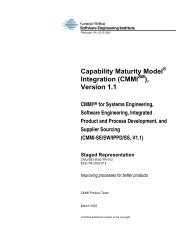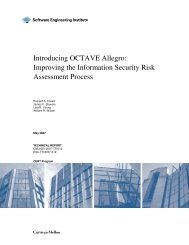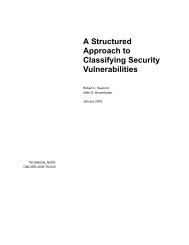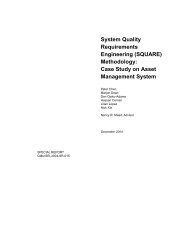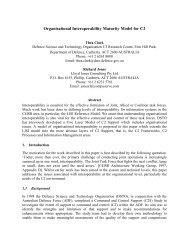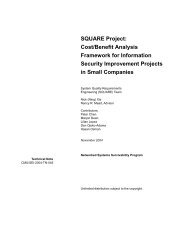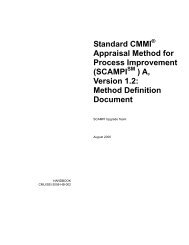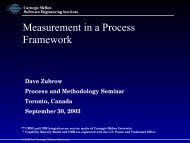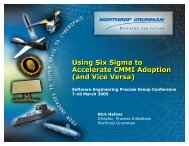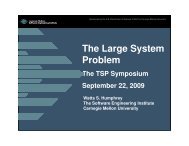State of the Practice of Computer Security Incident Response Teams ...
State of the Practice of Computer Security Incident Response Teams ...
State of the Practice of Computer Security Incident Response Teams ...
Create successful ePaper yourself
Turn your PDF publications into a flip-book with our unique Google optimized e-Paper software.
• audit and risk management specialists who help <strong>the</strong> CSIRT develop threat metrics and<br />
risk assessments for constituency systems<br />
• law enforcement liaisons or investigators involved in evidence collection, forensic analysis,<br />
and any resulting prosecution or court cases<br />
Support staff is usually required to help CSIRT members as needed by performing administrative<br />
services.<br />
3.5.3 Staff Skills<br />
Finding and retaining skilled CSIRT staff is not an easy task. Many teams have relayed how<br />
<strong>the</strong>y have had open positions for long periods <strong>of</strong> time before finding someone who had <strong>the</strong><br />
right skill set and personality to work in <strong>the</strong>ir CSIRT.<br />
Many <strong>of</strong> <strong>the</strong> authors <strong>of</strong> various incident handling books and articles discuss <strong>the</strong> types <strong>of</strong> skills<br />
required for CSIRT staff [Schultz 02, Smith 94, van Wyk 01, West-Brown 03]. Most agree<br />
that not only is it important for staff in <strong>the</strong> CSIRT to have <strong>the</strong> technical depth and breadth <strong>of</strong><br />
experience to handle incidents, it is equally important (sometimes even more so) to have<br />
“people” skills as well.<br />
It is obvious in many <strong>of</strong> <strong>the</strong> publications reviewed that CSIRT members are viewed as providing<br />
a “customer service” role. Van Wyk and Forno state that it is paramount that every<br />
team member have a positive, customer service-oriented attitude and that care be taken in<br />
hiring <strong>the</strong> right staff [van Wyk 01]. For many CSIRTs, a large portion <strong>of</strong> <strong>the</strong> interaction with<br />
o<strong>the</strong>rs occurs through oral communication (telephone conversations, presentations) or <strong>the</strong><br />
written word (email, documents, reports, alerts, advisories, etc.), so it is imperative that<br />
CSIRT staff be able to carry out <strong>the</strong>se communications clearly and concisely, be able to describe<br />
activity accurately, and provide information to <strong>the</strong>ir constituency or o<strong>the</strong>rs that is easy<br />
to understand. CSIRT staff may also be dealing with constituency members under great stress<br />
because <strong>of</strong> <strong>the</strong> current damage resulting from any incident activity, so <strong>the</strong>y must be able to<br />
relate to <strong>the</strong> situation and <strong>of</strong>ten even calm people down to be able to obtain <strong>the</strong> needed information<br />
to handle <strong>the</strong> incident. This is ano<strong>the</strong>r reason why personal skills are so important.<br />
Trustworthiness is paramount to <strong>the</strong> success <strong>of</strong> a CSIRT. This is one <strong>of</strong> <strong>the</strong> key lessons<br />
learned that is discussed in CERT/CC incident handling courses. O<strong>the</strong>r authors agree that<br />
CSIRT members must be trustworthy [Kossakowski 94a, Schultz 02, Smith 94, West-Brown<br />
03]. The words and actions <strong>of</strong> each member <strong>of</strong> <strong>the</strong> team can affect <strong>the</strong> reputation and constituent<br />
perceptions <strong>of</strong> <strong>the</strong> team.<br />
Smith says that in his opinion <strong>the</strong> attributes that any CSIRT staff member should have are (in<br />
order <strong>of</strong> priority)<br />
76 CMU/SEI-2003-TR-001



